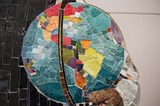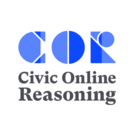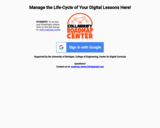
lesson plan for a student research project on animals
- Subject:
- English Language Arts
- Material Type:
- Activity/Lab
- Homework/Assignment
- Date Added:
- 04/27/2022

lesson plan for a student research project on animals

This unit includes a combination of fourth grade writing and social studies standards. It focuses on research and public discourse.

This 8th grade unit highlights main events of the Civil Rights Movement and navigates to the life of Jackie Robinson and watching the movie 42.

This writer’s reference condenses and covers everything a beginning writing student needs to successfully compose college-level work, including the basics of composition, grammar, and research. It is broken down into easy-to-tackle sections, while not overloading students with more information than they need. Great for any beginning writing students or as reference for advanced students!

Advanced subject focusing on techniques, format, and prose style used in academic and professional life. Emphasis on writing as required in fields such as economics, political science, and architecture. Short assignments include: business letters, memos, and proposals that lead toward a written term project. Methods designed to deal with the special problems of those whose first language is not English. Successful completion satisfies Phase II of the Writing Requirement. This workshop is designed to help you write clearly, accurately and effectively in both an academic and a professional environment. In class, we analyze various forms of writing and address problems common to advanced speakers of English. We will often read one another's work.

This unit explores the various ways information and ideas about climate change are presented through a variety of media. This includes the evaluation of social media posts, research into climate change issues, and an exploration of contemporary art and artists. This was designed and taught in an honors 9th grade English Language Arts Classroom by Dr. Tavia Quaid in response to student interest in climate change and to reinforce key information literacy skills.

The Internet provides virtually unlimited resources for students researching political topics, but many of the sites that appear in such searches are dubious. This digital task presents students with two websites and asks them to select the one that they would use to begin research on gun control, assessing their ability to identify the strengths and limitations of websites for learning about political topics.

BrainVentures are engaging & interactive, digital, enrichment activities meant to supplement your standard aligned curriculum. They can be used as indepent or collaborative practice as well as remotely or on campus.

For this lesson, students will learn how to cite in-text in MLA. They will watch a video, be directed to an easy to understand web page with citation examples, and even be able to complete a worksheet on citing in-text in MLA. Once students are done with this lesson, they will be ready to cite in-text in their own research paper.

The goal of this class is to provide readers with exposure to a variety of modern literature. In this course, you will be able to choose three genres of contemporary literature to explore. All assignments must reflect critical thinking based on the standards linked to the units. Each until will be introduced with a mini-research project. Your reading progress will be documented on your blog. A final book review will be written and posted on your GoodReads account.

This is a short unit for grades 3-5 about how to take notes and cite sources properly for a research project.

Create a Superhero is a five-part lesson plan asking students to research a current global issue which impacts them, their family or their community. Based on their research they create a superhero to help solve the issue. The project follows an adapted inquiry model and uses the online tools of G Suite for Education.

Students will learn why it is important to cite when writing. They will watch a video and look through a Prezi to learn how to cite their sources in APA. After they know the correct way to format their citations, they will work through a worksheets to identify sources that are formatted correctly. They will end the lesson by writing their own reference page for their research paper.

he classroom teacher has already led the students in the project kickoff and will have assistance in leading the technology portion of the project. Students have created some sort of presentation piece, possibly a slideshow or a poster, we will add narration to a video of the presentation.

In this science-based unit, students explore the world of energy. In the first half of the unit students learn what energy is, the different ways that energy is transferred from place to place, and the ways energy can be converted from one type to another. In the second half of the unit students explore the pros and cons of different types of renewable and nonrenewable energy. After learning about the different types of energy, students will grapple with what the world’s energy future will look like if more renewable solutions aren’t found, particularly in their communities. Through a combination of reading and research, it is our hope that students begin to build a deeper understanding of energy and its influence on our lives.
This unit builds on to the informational reading skills and strategies developed in previous units. At this point in the year we assume that students are able to actively read and annotate informational texts in order to build understanding of a topic. Therefore, the focus of this unit is on refining students’ ability to use different strategies to comprehend denser scientific texts. In particular, students will continue working on determining the main idea, summarizing key details, explaining cause and effect, using text features to improve understanding, and explaining how an author uses text features to elaborate on key concepts and ideas.

Composition 2 is an expository writing course requiring more advanced writing skills than Composition 1, yet reviewing and incorporating some of the same skills. This course teaches research skills by emphasizing the development of advanced analytical/critical reading skills, proficiency in investigative research, and the writing of persuasive prose including documented and researched argumentative essays. A major component of this course will be an emphasis on the research process and information literacy.

In this lesson, students read pages 4-22, "Las Uvas," in Esperanza Rising and as a whole group identify how the structure of the chapter contributes to the overall story (RL.5.1, RL.5.5).
In triads, students then research one of three topics to build background knowledge about the historical setting of Esperanza Rising. Working in expert groups allows small groups to engage in an effective, time-efficient comprehension of a broader topic because students become an expert in one topic and hear oral summaries of the others to gain an understanding of the broader topic.
This lesson is the first in a series of three that include built-out instruction for the use of Goal 1 Conversation Cues. Conversation Cues are questions teachers can ask students to promote productive and equitable conversation (adapted from Michaels, Sarah and O'Connor, Cathy. Talk Science Primer. Cambridge, MA: TERC, 2012. Based on Chapin, S., O'Connor, C., and Anderson, N. [2009]. Classroom Discussions: Using Math Talk to Help Students Learn, Grades K-6. Second Edition. Sausalito, CA: Math Solutions Publications). Goal 1 Conversation Cues encourage all students to talk and be understood. As the modules progress, Goal 2, 3, and 4 Conversation Cues are gradually introduced. See the Tools page for the complete set of cues. Consider providing students with a thinking journal or scrap paper. Examples of the Goal 1 Conversation Cues you will see in the next two units are (with expected responses):
After any question that requires thoughtful consideration:
"I'll give you time to think and write or sketch."
"I'll give you time to discuss this with a partner."
To help students share, expand, and clarify thoughts:
"Can you say more about that?"
"Sure. I think that _____."
"Can you give an example?"
"OK. One example is _____."
"So, do you mean _____?"
"You've got it./No, sorry, that's not what I mean. I mean _____."
Note that Goal 1 Conversation Cues (and expected student responses) were built into the Discussion Norms anchor chart in Lesson 1. Conversation Cues and discussion norms are similar in that they seek to foster productive and collaborative conversation. Furthermore, Conversation Cues aim to ensure equitable conversation by gradually building student capacity to become productive, collaborative participants. Goal 1 Conversation Cues focus on the fundamentals of encouraging students to talk and be understood. Goals 2-4 take students to deeper levels of conversation, from listening to others, to deepening their thinking, to thinking with others.
Students practice their fluency in this lesson by following along and reading silently in their heads as the teacher reads pages 4-22 of Esperanza Rising aloud during Opening A.
In this lesson, the habit of character focus is on working to become an ethical person. The characteristic that students practice is respect, as volunteers share out personal reflections on what happened in Esperanza Rising.
The research reading that students complete for homework will help build both their vocabulary and knowledge pertaining to human rights. By participating in this volume of reading over a span of time, students will develop a wide base of knowledge about the world and the words that help describe and make sense of it.

Students will complete research about an animal of their choice using the San Diego Zoo Kids Zoo website. The students will create a SlideShow Presentation to share with the class teaching about their animal. The class will use given “clues” based on research to guess the student's animal.

Students will learn how to use the Internet to find facts about their topic. Students will be searching safe sites that are credible, teaching students that finding accurate information is very important when being an investigator.

WEEK 10, DAYS 1-5
Natural Disasters Research Project
We just finished reading about one type of natural disaster, earthquakes, and today we will discuss other types of natural disasters.
You will choose the one that interests you the most and conduct research to learn more information. To help you learn a little bit about the different types of natural disasters we are going to view a video. You will use a graphic organizer to jot notes about each natural disaster to help you decide which one you want to research and learn more about.
Today you are going to choose one natural disaster to begin researching.
Now that you have chosen your natural disaster you are going to start researching. We are going to use the same graphic organizer we always do, but we are going to use it to help make a plan and organize our notes. Students will work on researching their natural disaster.
Students will work on either finishing up gathering information OR choosing which information to share.
Students will work around the room on either their graphic organizer or their draft. completed their graphic organizer and add new details, facts, and definitions to their graphic organizer.